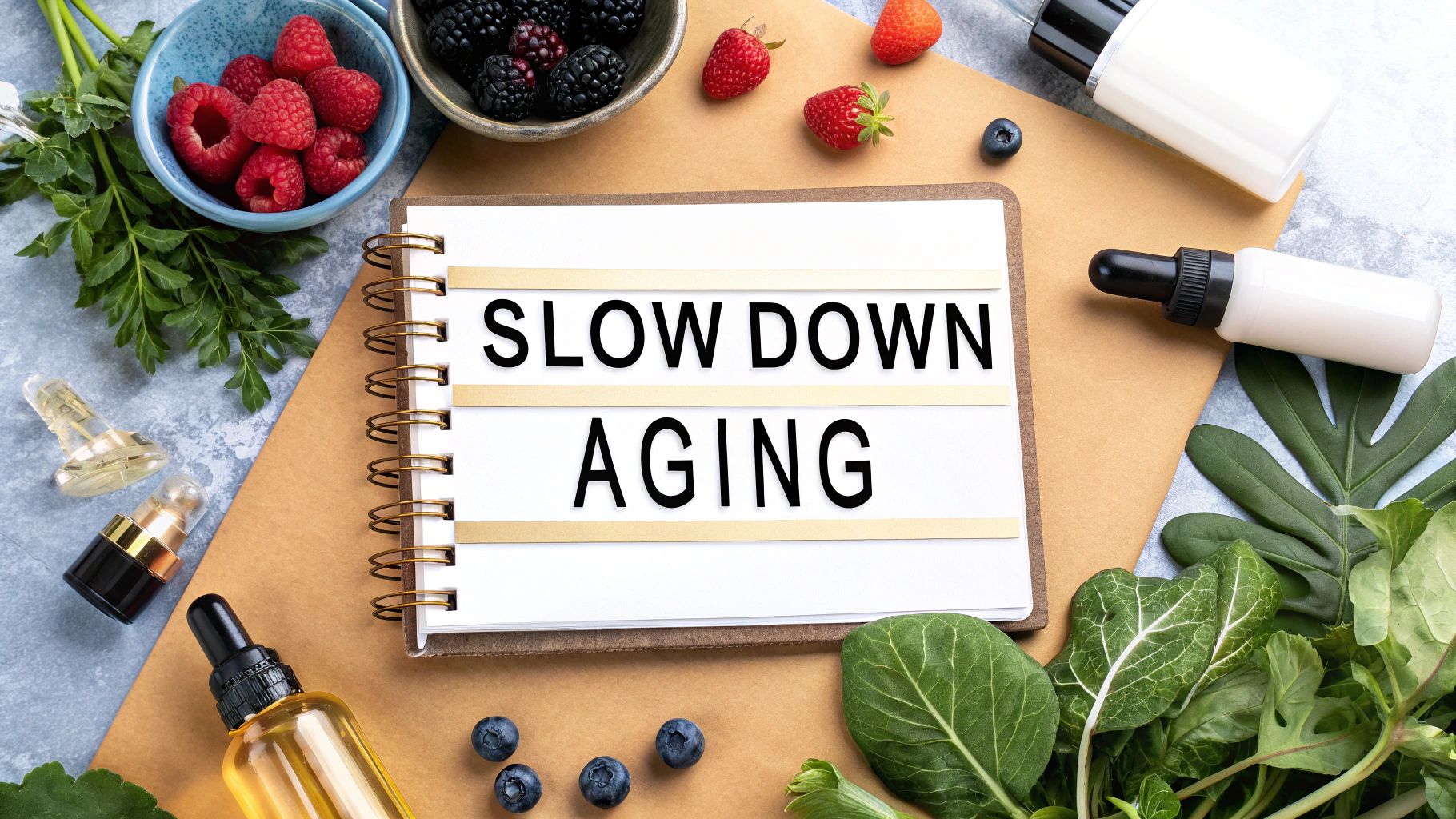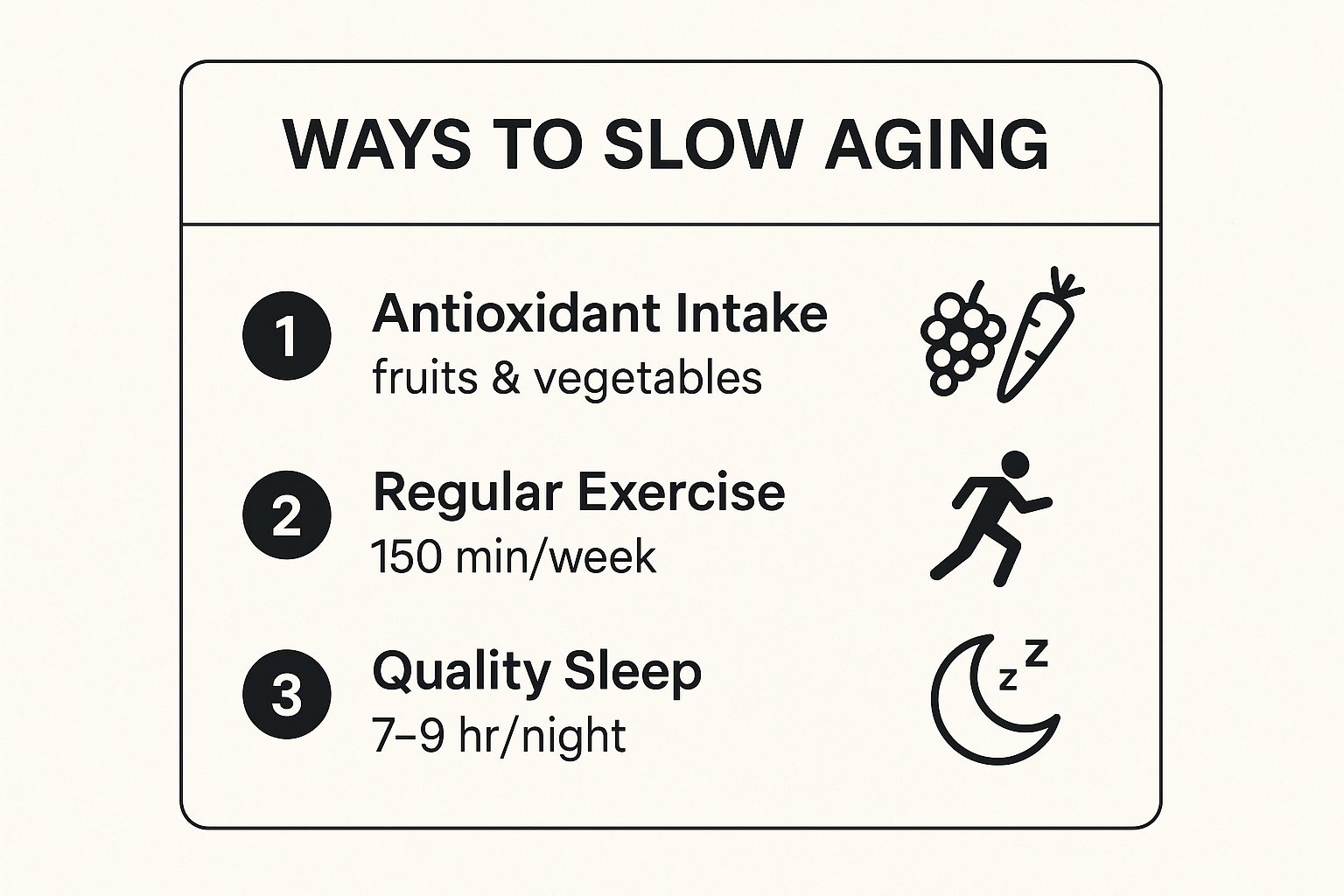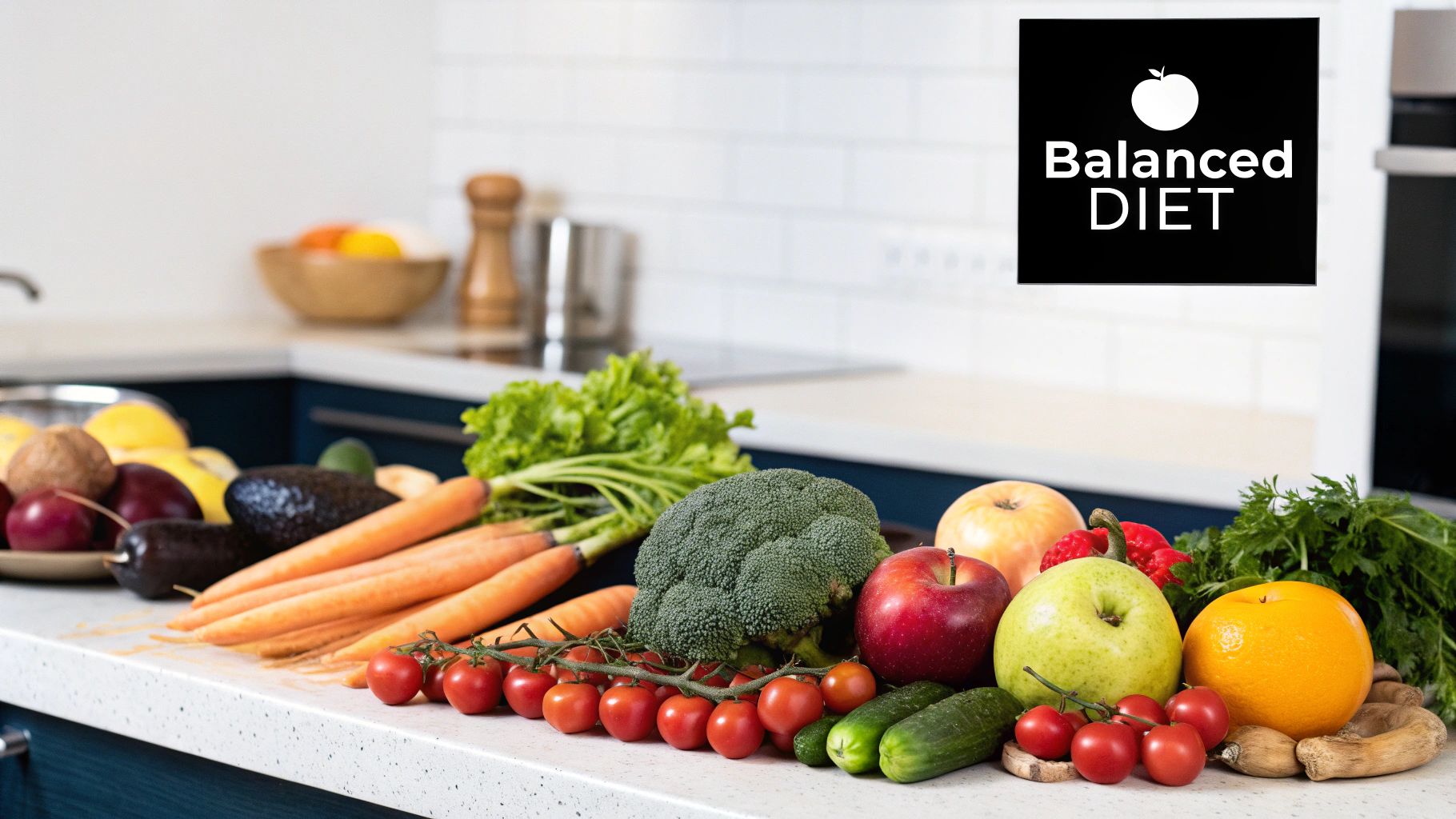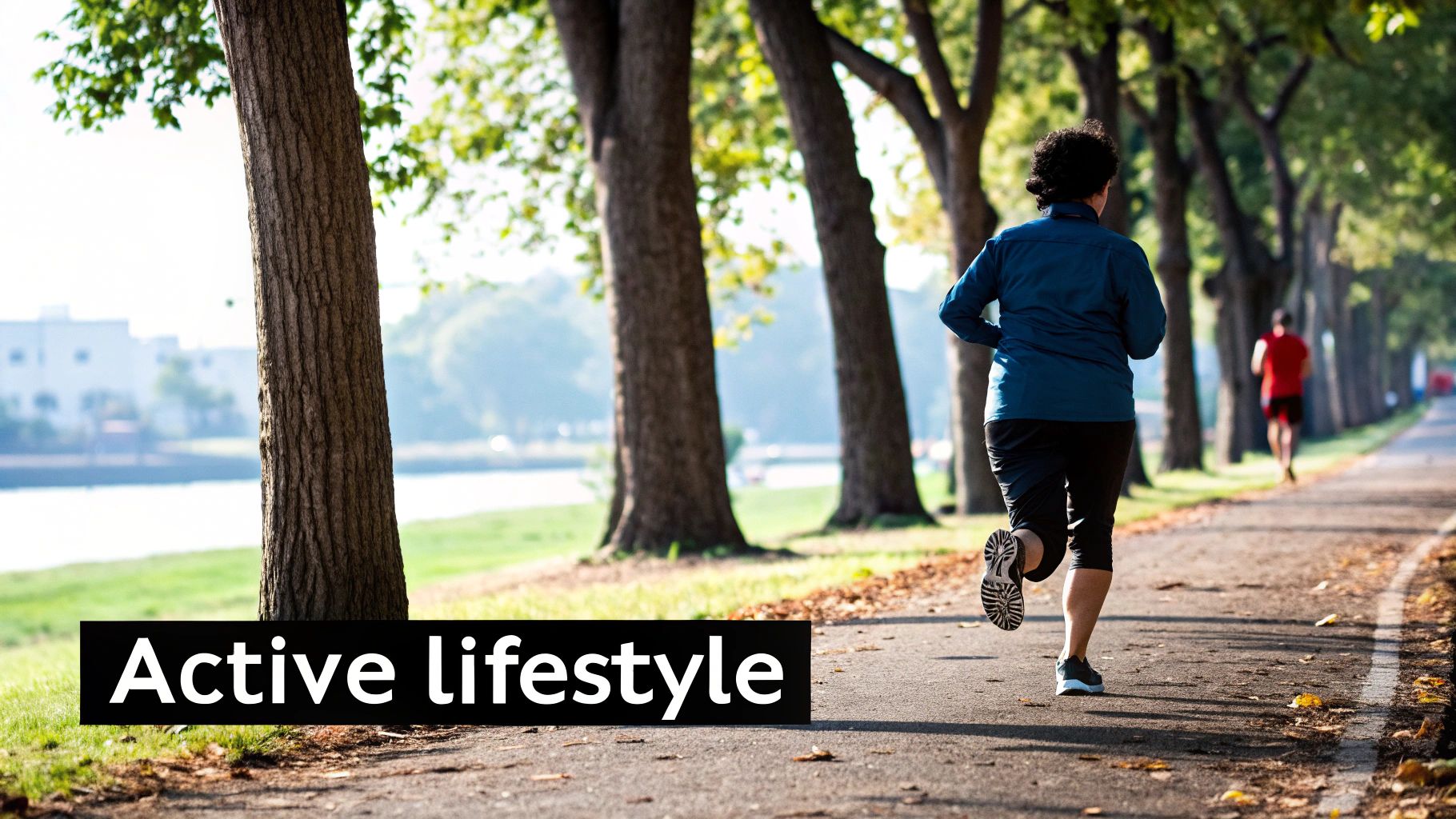
How to Slow Down Aging and Feel Your Best
So, how do you actually slow down the aging process? Forget the idea of a single magic potion. From my experience, the most effective approach is a comprehensive one built on four key pillars: intelligent skincare, strategic nutrition, consistent lifestyle habits, and targeted professional support. It’s not about finding a quick fix, but about making deliberate, science-backed choices that become second nature.
Your Blueprint for Lifelong Vitality
Think of this less as "anti-aging" and more as building a powerful defense system for your body's cells. This is a proactive strategy. Instead of just reacting to wrinkles or feeling a dip in your energy, you're creating a resilient foundation that supports your healthspan—the number of years you live in good, vibrant health.
The good news? This journey doesn't require a complete life overhaul overnight. It’s all about the synergy of small, consistent actions that add up beautifully over time. Each pillar works together, whether it's protecting your skin with the right ingredients or fueling your body with antioxidant-rich foods.
An effective anti-aging strategy is truly a sum of its parts. To give you a clear overview, I've broken down these core components into a simple table. Think of it as your high-level map.
The Four Pillars of an Anti-Aging Strategy
| Pillar | Primary Focus | Key Benefits |
|---|---|---|
| Intelligent Skincare | Protecting against environmental damage and stimulating cellular repair with proven ingredients. | Improved skin texture, reduced fine lines, enhanced skin barrier function, and a more even skin tone. |
| Strategic Nutrition | Reducing inflammation and oxidative stress through a diet rich in whole foods, antioxidants, and healthy fats. | Increased energy, better cellular health, weight management, and reduced risk of age-related diseases. |
| Consistent Lifestyle | Prioritizing quality sleep, regular physical activity, and effective stress management techniques. | Balanced hormones, preserved muscle mass, improved mental clarity, and reduced cellular damage. |
| Professional Support | Utilizing advanced treatments to address specific concerns and boost rejuvenation from the inside out. | Deeper collagen stimulation, targeted correction of sun damage, and accelerated results for skin firmness and tone. |
By integrating these four pillars, you're not just treating symptoms on the surface; you're addressing the aging process at its roots.
The goal isn't to stop aging—that’s impossible. It's about managing the process with grace and strength. By arming yourself with this knowledge, you can take control and build a personalized roadmap that works for your body.
This visual drives home how some of the most impactful changes are tied to your daily habits.

As the image shows, fundamental choices—what you eat, how you move, and how well you rest—form the bedrock of any successful long-term strategy. This guide will give you that clear roadmap, packed with actionable steps you can start taking today.
Build a Skincare Routine That Actually Works

A powerful skincare routine is so much more than a nice-to-have luxury. I see it as a fundamental part of any serious strategy for how to slow down aging. It’s your skin's daily defense against environmental damage and your primary tool for repairing what’s already there.
But let's be honest, walking down the skincare aisle can be completely overwhelming.
The trick is to look past the marketing hype and build a routine that’s grounded in real science. This means knowing what to use, when to use it, and most importantly, why. A routine doesn’t need a dozen steps to be effective, but it absolutely must be consistent and packed with proven, powerhouse ingredients.
Your Morning Skincare Non-Negotiables
Think of your morning routine as having two simple goals: protection and prevention. It’s all about getting your skin ready to face the day, from damaging UV rays to city pollution.
- Gentle Cleanser: Always start your day with a gentle, hydrating cleanser. You want to wash away overnight impurities without stripping your skin of its natural oils. That moisture barrier is your best friend.
- Antioxidant Serum (Vitamin C): This is your daytime hero. A good Vitamin C serum is like an extra layer of armor under your sunscreen, neutralizing free radicals, brightening your complexion, and even supporting collagen.
- Moisturizer: A solid moisturizer is crucial for locking in hydration and keeping that skin barrier strong. Even if your skin is on the oily side, a lightweight, non-comedogenic formula is essential for maintaining balance.
- Broad-Spectrum Sunscreen (SPF 30+): I can't stress this enough—this is the single most important step. Daily, year-round sunscreen isn't optional. It protects you from the UV radiation responsible for up to 80% of the visible signs of aging, including wrinkles and sunspots.
Your Evening Skincare for Repair and Rejuvenation
At night, your skin’s focus shifts from defense to repair. Your evening routine should be designed to support and accelerate this natural healing process, which is why it’s the perfect time for more potent, targeted ingredients.
The demand for products that deliver real results is through the roof. The global anti-aging market, valued at about USD 79 billion in 2025, is expected to explode to around USD 162.6 billion by 2034. This isn't surprising—people are tired of empty promises and are actively seeking proven solutions, especially in face creams and lotions.
A focused evening routine is how you tap into those powerful innovations for yourself.
An Expert's Take: Your skin is most receptive to active ingredients while you sleep. This makes nighttime the ideal window to apply products with retinoids and peptides. You’re giving these ingredients a full, uninterrupted period to stimulate collagen, promote cell turnover, and maximize their restorative benefits.
After cleansing, this is where the magic happens. Consider adding these power players:
- Retinoids (Vitamin A): This is the undisputed gold standard in anti-aging. Ingredients like retinol and prescription tretinoin work by speeding up cell turnover and firing up collagen production. The result? Fewer fine lines, smoother texture, and faded dark spots. Just be sure to start slow, maybe once or twice a week, to let your skin adjust.
- Peptides: Think of peptides as messengers that tell your skin to create more collagen and elastin. Serums and creams with peptides are fantastic for helping firm the skin and improve its bounce.
- Hydrating Agents (Hyaluronic Acid): While not an "anti-ager" in the traditional sense, hyaluronic acid is a moisture superstar, holding up to 1,000 times its weight in water. Applying it before your final moisturizer keeps skin looking plump, hydrated, and feeling resilient. For more on this, explore our guide on how to reduce wrinkles naturally.
By setting up this dual morning and evening routine, you create a 24-hour cycle of protection and repair. This consistent, ingredient-focused strategy turns your daily skincare from a simple habit into one of your most powerful tools for slowing down the clock.
Eat for Longevity and Cellular Health

While a great skincare routine acts as your shield from the outside world, your diet is what defends and rebuilds your body from the inside out. The food you put on your plate has a direct line to inflammation, cellular health, and the oxidative stress that makes us look and feel older. Learning how to slow down aging through nutrition isn't about harsh restrictions; it's about eating strategically for vitality.
The whole game is centered around an anti-inflammatory, antioxidant-rich diet. Think of antioxidants as your cells' personal bodyguards, neutralizing the unstable molecules called free radicals that wreak havoc on your cells, DNA, and precious collagen. Inflammation, on the other hand, is like a constant, low-level fire simmering in your body, and it absolutely accelerates the aging process.
By consciously choosing the right foods, you give your body the exact tools it needs to put out that fire and protect itself from daily damage.
The Power of Polyphenols and Antioxidants
Your first line of dietary defense is surprisingly simple: color. Those vibrant pigments in fruits and vegetables are often potent antioxidants known as polyphenols, and they are fantastic at fighting cellular stress.
A really easy but effective strategy is just to make your plate as colorful as possible. Imagine a single meal with deep red beets, bright orange sweet potatoes, and dark green spinach. You're covering so many bases right there.
Here are a few specific food groups I always recommend prioritizing:
- Berries: Blueberries, strawberries, and raspberries are bursting with anthocyanins. These compounds give them their gorgeous color and also happen to have incredibly strong anti-inflammatory properties.
- Leafy Greens: Spinach, kale, and Swiss chard are nutritional powerhouses, loaded with vitamins A, C, and K, plus antioxidants like lutein and zeaxanthin that protect your cells.
- Cruciferous Vegetables: Broccoli, cauliflower, and Brussels sprouts contain a special compound called sulforaphane, which is celebrated for its ability to support detoxification and antioxidant pathways.
Making these foods a regular part of your diet means you're constantly resupplying your body's defense system.
Healthy Fats and Lean Proteins
Let’s be clear: not all fats are bad. In fact, some are essential. Omega-3 fatty acids are true superstars for their proven ability to lower inflammation and support brain health, making them a cornerstone of any age-defying diet.
At the same time, getting enough protein is absolutely crucial for maintaining muscle mass, something that we naturally lose as we get older. Keeping your muscle is key for a healthy metabolism and overall physical strength.
A Practical Tip: Try swapping just one red meat meal per week for a serving of fatty fish like salmon. It’s a simple change that dramatically boosts your omega-3 intake while cutting back on potentially inflammatory saturated fats.
Here’s what to focus on bringing into your kitchen:
- Fatty Fish: Salmon, mackerel, and sardines are prime sources of the most powerful omega-3s, EPA and DHA. I suggest aiming for at least two servings every week.
- Nuts and Seeds: Walnuts, flaxseeds, and chia seeds are fantastic plant-based sources of omega-3s, and they also provide other healthy fats and fiber.
- Lean Protein: Sources like chicken, turkey, beans, and lentils give you the essential amino acids your body needs to repair tissues and build muscle, all without the excess saturated fat.
These choices support everything from your skin's protective barrier to the very structure of your body. What’s truly incredible is the data: broad statistical evidence shows that healthy diets rich in antioxidants, combined with exercise, can lower the risk of age-related diseases by a staggering 30-40%. You can discover more insights about anti-aging market trends on Grandview Research.
The Role of Caloric Balance
You’ve probably heard about caloric restriction in longevity research. While a severe, long-term diet isn't practical or even healthy for most of us, the principle behind it—avoiding chronic overeating—is incredibly valuable.
This doesn't mean you need to obsessively count every single calorie. A better approach is what I call "caloric intelligence." Focus on eating nutrient-dense foods that make you feel full and satisfied without being packed with empty calories. This helps you maintain a healthy weight, which reduces the strain on your joints, heart, and entire metabolic system. It's a mindful way of eating that supports your long-term health goals without feeling like a punishment.
When you fuel your body from the inside with these high-quality nutrients, it can truly amplify the results you see from professional treatments. For instance, a diet rich in vitamin C and protein provides the building blocks your skin desperately needs for new collagen—perfectly complementing a treatment designed to stimulate it. Check out our guide to learn more about the science behind microneedling benefits and see how it works hand-in-hand with good nutrition.
Adopt Lifestyle Habits That Defy Age

While the right skincare and diet are your front-line defense, it's your daily habits that truly make or break your anti-aging efforts. If you're serious about learning how to slow down aging, you have to get the big three right: sleep, exercise, and stress management.
These aren't just wellness trends. They are the core activities that directly govern your hormones, cellular repair, and inflammation levels. Think of them as the bedrock that makes everything else—from your vitamin C serum to your antioxidant-rich diet—work that much better.
Prioritize Deep, Restorative Sleep
Sleep is anything but passive. It’s your body’s dedicated maintenance shift, where it gets to work repairing cellular damage and producing critical hormones. For instance, your body’s production of human growth hormone (HGH) kicks into high gear during deep sleep.
HGH is essential for keeping our tissues and organs in good shape. As we get older, our pituitary gland naturally produces less of it, which has prompted some to look into synthetic HGH treatments. However, most experts advise against this for healthy adults because of the potential health risks.
Honestly, the safest and most effective way to boost your natural HGH is simply to get consistent, high-quality sleep.
A consistent lack of sleep is one of the fastest ways to accelerate aging. It throws your cortisol out of whack, weakens your skin's protective barrier, and short-circuits the nightly repair cycle that keeps you looking and feeling vibrant.
Getting better sleep doesn't require a major overhaul. Try these simple but powerful tweaks to your routine:
- Create a Cool, Dark Sanctuary: Your body needs to cool down to initiate sleep. Keep your bedroom cool and invest in blackout curtains to block out every bit of disruptive light.
- Implement a Digital Curfew: The blue light from your phone and laptop screen is a notorious melatonin-suppressor. Make a rule to put all devices away at least an hour before you plan to sleep.
- Stick to a Schedule: Going to bed and waking up at roughly the same time every day—yes, even on weekends—is the single best thing you can do to reinforce your body's internal clock.
Move Your Body Intelligently
Exercise is one of the most powerful tools we have to fight aging right down to the molecular level. This is about so much more than burning calories. It’s about preserving the very systems that we associate with youth: lean muscle, strong bones, and a zippy metabolism.
The secret is to find a balance between different kinds of movement. Just hammering the treadmill or only lifting weights means you're missing out on comprehensive benefits.
A truly effective fitness plan has a few key components:
- Strength Training: This is non-negotiable. Lifting weights or using your own body weight for resistance is crucial for maintaining, and even building, muscle. More muscle means a higher metabolism. Aim for at least two sessions a week.
- Cardiovascular Exercise: Brisk walking, cycling, or swimming does wonders for your heart, improves blood flow (hello, glowing skin!), and is a fantastic mood booster. The standard recommendation is 150 minutes of moderate-intensity cardio each week.
- Flexibility and Mobility Work: Don't forget to stretch! Incorporating yoga or Pilates keeps your joints supple and helps you move freely, preventing that stiff, "old" feeling.
Master Your Stress Response
Think of chronic stress as a silent aging accelerator. When you're constantly on edge, your body is flooded with cortisol. In small doses, cortisol is fine, but when it's always high, it actively breaks down collagen, sparks inflammation, and encourages fat storage right around your middle.
Learning to manage your stress isn't an indulgence—it’s a core requirement for long-term vitality. Finding a technique that resonates with you and practicing it regularly can dramatically lower your cortisol levels and shield your body from its aging effects.
Here are a few proven methods to get you started:
- Mindfulness and Meditation: You don't need to sit for an hour. Just 5-10 minutes of a guided meditation app each day can begin to rewire your brain’s knee-jerk reaction to stress.
- Strategic Breathing: Simple deep breathing can instantly flip the switch from your "fight-or-flight" system to your "rest-and-digest" mode. Try box breathing: inhale for four counts, hold for four, exhale for four, and hold for four. You can do it anywhere.
- Time in Nature: A walk in the park isn't just a nice idea. Studies show that spending time in green spaces measurably lowers cortisol, reduces blood pressure, and boosts mental clarity.
By weaving these three habits into your life, you create a powerful synergy that slows aging from every possible angle. They are the foundation that allows all your other efforts to truly shine.
Explore Professional Anti-Aging Treatments
While a solid at-home skincare routine is your daily defense, professional treatments can take your results to a whole new level. Think of them as targeted boosts that work much deeper than creams and serums ever could, addressing concerns right at the source.
This isn’t about chasing a wrinkle-free face, but about smartly investing in your skin’s long-term health. Knowing what’s out there helps you have a real, informed conversation with a professional and pick a treatment plan that feels right for you and your goals.
And it's a booming field. The global anti-aging market was valued at a staggering USD 73 billion in 2024 and is expected to double to around USD 141 billion by 2034. This explosion in growth, with North America leading the charge at a 40% market share, is all thanks to new scientific breakthroughs and a huge demand for effective, non-invasive options. You can read more about these market trends and the science behind them. For us, that means better, safer, and more accessible treatments are always just around the corner.
Treatments That Kickstart Your Skin's Own Renewal
Before jumping to injectables, it's worth looking at treatments designed to wake up your skin's natural repair mechanisms. These are fantastic for improving the overall quality, texture, and firmness of your skin, making them a true cornerstone of any serious anti-aging plan.
- Microneedling: Sometimes called collagen induction therapy, this is a game-changer for texture. It uses ultra-fine needles to create tiny, controlled micro-injuries in the skin. Your body immediately rushes to heal them, creating a wave of fresh collagen and elastin. It works wonders on fine lines, acne scars, and overall smoothness.
- Chemical Peels: Don't let the name scare you. These treatments use specific acid solutions to gently lift away dull, outer layers of skin. What’s left behind is a brighter, more even-toned complexion. Peels come in different strengths, from a light "lunchtime" peel with no downtime to deeper ones that tackle significant sun damage and pigmentation.
- Laser Therapy: This is a broad category, but incredibly versatile. Treatments like IPL (Intense Pulsed Light) are brilliant for zapping away sun spots and redness. Then you have fractional lasers, which go deeper to stimulate profound collagen remodeling, making a real dent in wrinkles and improving skin laxity.
Often, the best results come from combining these approaches. To get a better feel for how a professional might customize these for you, take a look at our guide to professional anti-aging facial treatments.
Understanding Injectables: Neuromodulators and Fillers
Injectables are a different tool in the toolbox. They offer more immediate, targeted results for specific signs of aging and can work beautifully alongside the foundational treatments we just talked about.
It's really important to know that neuromodulators and dermal fillers are not the same thing—they do completely different jobs.
Key Distinction: Think of it this way: Neuromodulators relax muscles to soften expression lines, while fillers restore lost volume to smooth out static lines and folds.
A Quick Comparison of Injectables
| Treatment Type | How It Works | Best For | Typical Duration |
|---|---|---|---|
| Neuromodulators | Blocks the nerve signal that tells a muscle to contract. | Softening crow's feet, forehead lines, and the "11s" between your brows. | 3–4 months |
| Dermal Fillers | A gel-like substance (usually hyaluronic acid) is injected to add volume. | Plumping lips, filling in smile lines, and rebuilding cheek structure. | 6–18 months |
Deciding to incorporate professional treatments is a personal choice, but a powerful one. By understanding what these procedures actually do, you can build a truly comprehensive strategy. A good practitioner won't just inject you; they'll help you weave these treatments into your lifestyle and skincare routine so that every part of your plan works together.
Your Anti-Aging Questions Answered
Even with the best roadmap, you're bound to have questions. This whole journey of aging gracefully is deeply personal, and it's completely normal to wonder if you're doing the right things, at the right time, and what you should really expect to see in the mirror.
Let's dig into some of the most common questions I get from clients. Getting straight, honest answers helps you build a routine with confidence and set goals that are actually achievable.
At What Age Should I Start an Anti-Aging Routine?
The honest-to-goodness best answer? Yesterday. But today is a close second. Prevention will always be easier, cheaper, and more effective than trying to reverse damage later on.
Most experts, myself included, agree that your early 20s are the perfect time to lock in a solid skincare routine. The absolute non-negotiable is daily sunscreen, because this is right around when your body's natural collagen factory starts to slow down its production.
But please, don't let that discourage you if you're past that point. It is never too late to make a huge difference.
Whether you're 35 or 65, embracing a nutrient-dense diet, a consistent fitness habit, and a potent skincare regimen can bring about stunning improvements in your skin's health and how you feel. The key isn't a number on a birthday cake; it's consistency. What you do today is what truly counts.
What Is the Single Most Important Step to Slow Down Aging?
That’s a tough one, because a holistic approach is always king. But if you twisted my arm and made me pick just one thing for your skin, it’s this: daily, non-negotiable use of a broad-spectrum sunscreen with at least SPF 30.
Think about it this way: UV exposure is responsible for up to 80% of the visible signs of aging we see—wrinkles, sagging, and brown spots. There isn't a serum or cream on the planet that can undo the damage the sun does every single day.
Now, if we're talking about your entire body, the game-changer is a combination of consistent physical activity and a balanced, anti-inflammatory diet. This dynamic duo is the ultimate support system, fueling everything from your heart and bones right down to the health of your individual cells.
The Expert Bottom Line: Sunscreen is your skin's top shield against the outside world. But movement and nutrition are the foundation you build from the inside out. Together, they're an incredibly powerful defense.
How Long Until I See Results From My New Routine?
This is where patience becomes your superpower. The timeline for seeing results really depends on what you're changing.
- Skincare: You'll likely notice better hydration and a bit of a glow within a few weeks. For the heavy hitters that actually build collagen, like retinoids, you need to be in it for the long haul—it can take 3 to 6 months of consistent use to see a real change in fine lines.
- Lifestyle Changes: You'll feel the benefits here much faster. More energy, clearer thinking—that can happen within a month of cleaning up your diet and moving more. The deep, cellular benefits, however, are cumulative. They build quietly over years.
- Professional Treatments: This is where you get the most immediate "wow" factor, often after just one session. But remember, these almost always require a maintenance plan to keep those results looking great.
It’s a marathon, not a sprint. My advice? Celebrate the small victories—the softer skin, the extra energy—while you give the bigger, long-term changes time to work their magic.
Are Expensive Anti-Aging Products Worth the Money?
Not always. A product's effectiveness comes down to its active ingredients, their concentration, and how well it's formulated—not a hefty price tag or fancy jar.
Honestly, many affordable drugstore brands have fantastic, scientifically-backed products with proven ingredients like retinol, vitamin C, peptides, and niacinamide. The secret to being a smart shopper is to stop looking at the brand name first and start flipping the box over to read the ingredient list.
Focus on the science, not the sales pitch. When you understand what key ingredients do, you can find amazing, high-performing products that fit any budget. A product's value is in what it does for your skin, not what it costs.
Should I Consider Taking Human Growth Hormone?
You've probably seen Human Growth Hormone (HGH) hyped up as some kind of fountain of youth in a syringe. While our natural HGH levels do decline as we age, experts strongly caution against using synthetic HGH for anti-aging if you're otherwise healthy.
Studies have shown that while it might slightly increase muscle mass, that doesn't actually translate into more strength. Worse, the side effects can be serious, including joint pain, swelling, and even an increased risk for other health problems. HGH is a prescription drug for a reason—it's meant for specific, diagnosed medical conditions.
The best, safest way to support your body's own growth hormone production is through your lifestyle. The number one thing you can do? Prioritize getting 7-9 hours of quality sleep every night.
Ready to build a personalized skincare plan with professional guidance? At Olive Skin Therapy, we combine expert knowledge with advanced treatments like microneedling and customized facials to help you achieve your healthiest skin. Book your consultation today and start your journey to lasting radiance.
